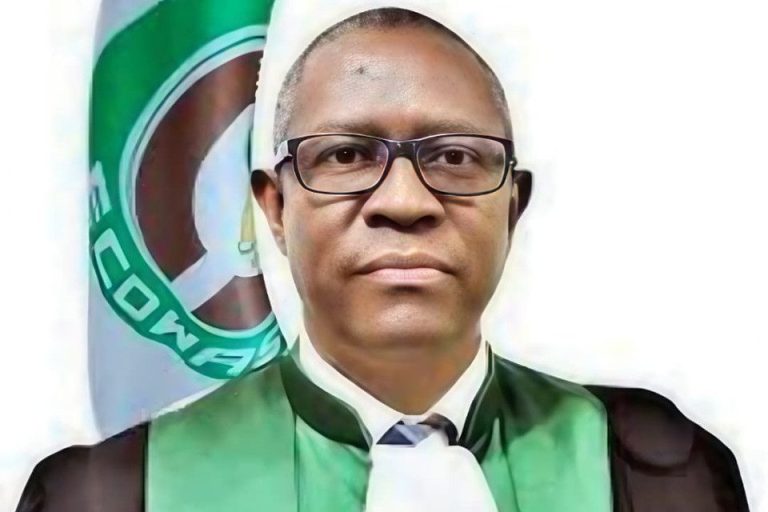The ECOWAS Community Court of Justice has issued a Writ of Execution to the Federal Government of Nigeria asking it to implement the judgment and orders of the Court delivered on April 9, 2025, directing Nigeria, among other things, to repeal or amend some provisions of Kano State’s blasphemy laws, which it ruled violated the African Charter on Human and Peoples’ Rights (ACHPR) and the International Covenant on Civil and Political Rights (ICCPR).
The Writ, issued by the Court’s Chief Registrar, Dr Yaouza Ouro-Sama, pursuant to Article 24 of the Court’s Supplementary Protocol A/SP.1/01/05, was delivered to the office of the Attorney-General of the Federation on October 6, 2025.
In the Writ, the court requested the Attorney-General of the Federation and Minister of Justice, as the competent national authority responsible for the enforcement of judgments of the ECOWAS Court, and in accordance with the provisions of Article 24(4) of the Supplementary Protocol, to execute the judgment and orders of the Court according to the relevant Rules of Civil Procedure of Nigeria and notify the Court accordingly.
The Registrar urged the Attorney-General to ensure that he returns to the Court immediately after the execution of the Writ on what Nigeria has done under the Writ, adding that the Writ can only be suspended by a decision of the Court.
The Court’s judgment arose in a suit filed on October 6, 2023, by a human rights organisation, Expression Now Human Rights Initiative, against the Federal Government of Nigeria through a Lagos-based human rights lawyer, Mr Solomon Okedara, in which the organisation claimed that Nigeria’s use of blasphemy provisions in its criminal laws to arrest, detain, imprison, and impose death sentences on its citizens, as well as its failure to prevent extra-judicial killings by mobs, of persons alleged to have committed blasphemy, are a violation of the rights to freedom of religion, freedom of expression, and life under the provisions of the ACHPR, the ICCPR, and the United Nations Convention against Torture and other forms of Cruel, Inhuman, or Degrading Treatment (UNCAT), as well as other international human rights instruments binding on Nigeria.
The organisation alleged that at different times within Nigerian territory, citizens have been subjected to arbitrary arrest and detention, summary prosecution and imposition of jail terms or death sentences for the offence of blasphemy, and that in addition to this, several citizens have been subjected to torturous and gruesome extra-judicial killing on the ground of blasphemy without the killers being made to face the consequences of their crimes.
In its unanimous judgment, the Court, presided over by Justice Ricardo Claudio Monteiro Goncalves, with Justice Dupe Atoki (Member/Judge Rapporteur) and Justice Edward Amoako Asante (Member), assisted by the Chief Registrar, Dr Yaouza Ouro-Sama, dismissed Nigeria’s challenge to its jurisdiction in the matter, ruling that since the case concerns allegations that Nigeria is in violation of human rights provisions under the ACHPR and other international human rights instruments binding on Nigeria, the Court has jurisdiction to determine the case.
The Court said it appreciates that religion is a sensitive topic that could provoke emotional outbursts as individuals defend their deeply held religious beliefs or objects of worship, which could consequently lead to a breakdown of public order, adding that the prevention of breakdown of law and order falls within the ambit of collective security contemplated in Article 27(2) of the African Charter as a legitimate reason for limitation of rights. It, therefore, held that Section 210 of the Penal Code of Kano State had a legitimate objective.
It, however, noted that Section 210 of the Penal Code Law of Kano State sets a limitation on the right to freedom of expression, saying that although the limitation is provided for by law, since the provision of the law contains the words “in such a manner as to be likely to lead to a breach of peace”, the words are vague and are not precise as they do not clearly set out the parameters of the conduct that is prohibited.
Moreover, the Court said, being vague, the provision leaves room for individual discretion of law enforcement authorities in determining what is likely to lead to a breach of peace, with the result that the section does not satisfy the test of legality.
Regarding Section 382(b) of Kano State Sharia Penal Code Law 2000, which provides that “any person whosoever found using any expression by means of words, gestures, abusing the Holy Prophet Muhammad shall be convicted to death,” the Court said although the provision is a limitation on the exercise of the freedom of expression, because “religion is a sensitive topic that could provoke emotional outbursts as individuals defend their deeply held religious beliefs or objects of worship, with the potential of breakdown of public order,” there was a pressing need for such a law that seeks to maintain public peace and order while preventing violence.
But on the issue of whether the Law is necessary in a democratic society, the Court noted that the provision imposed the death penalty for abusing or insulting a religious leader and that although respect for religious beliefs is important, it should not come at the cost of free speech, justice, and human dignity.
Describing blasphemy as an offence against religious sentiments, not a crime that causes physical harm to individuals, it stressed that “Insulting someone is a verbal offence, not a violent crime.”
The Court said, “capital punishment is typically reserved for serious crimes like murder, terrorism, or genocide where there is a clear victim who have suffered grave harm, not speech or disrespect. The Court is of the opinion that there are less restrictive ways in which the State could limit the freedom of expression for the purpose of ensuring respect for the religious beliefs of others, and the preservation of public peace. In this vein, punishment for hate speech offers a more proportionate and right-based approach to addressing religious sensitivities while upholding freedom of expression. Instead of imposing excessive penalties like death sentences, hate speech law typically result in imposition of fines or imprisonment in severe cases.”
It held that “the imposition of the death penalty as punishment for abusing or insulting a religious figure is an excessive measure that cannot be said to be proportional to the aim of preserving the respect of others’ religious beliefs or preventing the breakdown of peace.”
The Court, therefore, ruled that both Section 210 of the Penal Code of Kano State and Section 382(b) of the Kano State Sharia Penal Code Law are incompatible with the obligations of Nigeria to guarantee freedom of expression pursuant to Article 9 (2) of the African Charter and Article 19 of the ICCPR.
The Court said, having held that Section 210 of the Penal Code of Kano State and Section 382(b) of the Kano State Sharia Penal Code Law are incompatible with Nigeria’s obligations to guarantee the freedom of expression, in consonance with the principle of international responsibility of States, it follows that Nigeria is responsible in international law for the violation of the right to freedom of expression as provided in Article 9(2) of the African Charter and Article 19 of the ICCPR.
It ordered Nigeria to repeal or amend the provisions of both Section 210 of the Penal Code of Kano State and Section 382(b) of Kano State Sharia Penal Code Law of 2000, and other similar legal provisions in its laws, to bring them into compliance with its obligations under Article 9(2) of the African Charter and Article 19 of the ICCPR.





